
How to Stay Safe During a Heat Wave
July 9, 2024Extreme heat can pose significant health risks, particularly for vulnerable groups like infants, children, pregnant women, and the elderly. As heat waves become more common and severe due to climate change, it is crucial to take proactive measures to protect yourself and your loved ones.
Understanding Heat Waves
- Definition: A heat wave is a period of unusually high temperatures that last for several days.
- Causes: Heat waves occur when warm air gets trapped in the atmosphere. Climate change, driven by greenhouse gas emissions, is making these events more intense and frequent.
Who Is Most at Risk?
- Infants and Children: They have difficulty regulating their body temperature and are at high risk of dehydration.
- Pregnant Women: Heat can lead to complications such as low birth weight, early birth, stillbirth, and gestational diabetes.
- Elderly: Older adults are more susceptible to heat stress and dehydration.
Preparation and Prevention
- Stay Informed: Monitor weather forecasts to plan activities accordingly.
- Emergency Kit: Keep essentials like oral rehydration salts, a thermometer, water, cooling towels, a fan or mister with batteries, and a checklist for identifying heat stress symptoms.
- Know How to Get Help: Have contact information for healthcare providers and emergency services readily available.
Keeping Your Home Cool
- Close curtains during the hottest parts of the day.
- Open windows at night to let cooler air in.
- Use fans and air coolers if available.
Staying Out of the Heat
- Avoid going outside during peak heat hours.
- Plan outdoor activities for early morning or late evening.
- Use sunscreen, stay in the shade, and wear hats or use umbrellas for protection.
Staying Cool and Hydrated
- Drink water regularly before feeling thirsty.
- Wear light, loose-fitting clothing, preferably cotton, to reduce heat rashes and sweat absorption.
- Use cotton bed sheets for better breathability.
- Carry a water bottle and a small towel to stay hydrated and cool down by placing the wet towel on your neck.
- Check for local heat relief or cooling centers.
Recognizing and Responding to Heat Stress
Symptoms of Severe Heat Stress:
- High body temperature
- Confusion or disorientation
- Lack of sweating despite the heat
- Rapid pulse or breathing
Immediate Actions:
- Cool Down: Move to a cooler place, remove excess clothing, and apply cool, wet cloths to the skin.
- Hydrate: Offer water or oral rehydration solutions if the person is conscious.
- Seek Medical Attention: If severe symptoms are present, call for an ambulance or transport the person to the nearest healthcare facility immediately.
By following these guidelines, you can help mitigate the risks associated with heat waves and ensure the safety and well-being of your family during extreme heat events.

